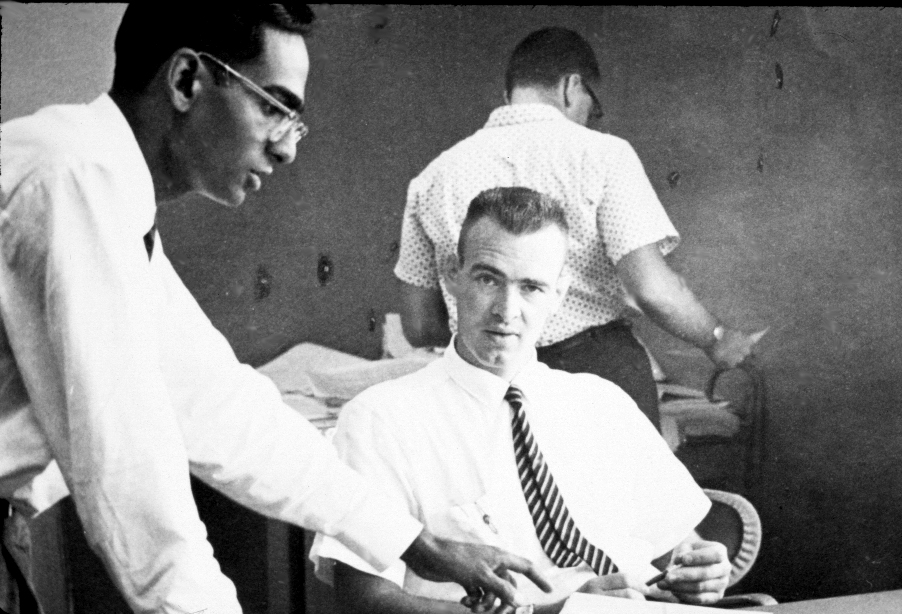Claim: aerosols prevented hurricanes from getting stronger, but will intensify now
Claim: aerosols prevented hurricanes from getting stronger, but will intensify now
From THE EARTH INSTITUTE AT COLUMBIA UNIVERSITY Tropical cyclones on track to grow more intense as temperatures rise Aerosols have compensated for greenhouse gases, but won’t in future Powerful tropical cyclones like the super typhoon that lashed Taiwan with 150-mile-per-hour winds last week and then flooded parts of China are expected to become even stronger […]
— gReader Pro…
Season Approaches: U.S. Hits Record 127 Months Since Major Hurricane Strike
With hurricane season set to start next week, Tuesday marks a record 127 months since a major hurricane has made landfall in the continental United States, according to statistics compiled by the National Oceanic and Atmospheric Administration’s (NOAA) Hurricane Research Division, which keeps data on all the hurricanes that have struck the U.S. since 1851.
The last major hurricane (defined as a Category 3 or above) to hit the U.S. mainland was Hurricane Wilma, which made landfall in Florida on Oct. 24, 2005.
Although a major hurricane typically strikes the U.S. about once every two years, no major hurricanes have made landfall in the U.S. for more than 10 and a half years.
The second longest stretch between major hurricane strikes was between the major hurricane that struck in August 1860 and the one that struck in September 1869, NOAA records show. The third longest stretch was between the major hurricane that struck in September 1900 and the one that struck in October 1906.
Wilma was one of four major hurricanes – including Hurricanes Dennis (July 10, 2005), Katrina (Aug. 29, 2005) and Rita (Sept. 24, 2005) – that came ashore in the U.S. during the 2005 hurricane season. (The season starts on June 1 and runs through November 30.)
Hurricanes Wilma, Rita and Katrina killed almost 4,000 people and caused an estimated $160 billion in damage that year, making it “one of the most active hurricane seasons in recorded history,” NOAA said in a statement marking the 10-year anniversary of the 2005 hurricane season.…
RIP: Pioneering Hurricane Forecaster & Climate Skeptic Dr. Bill Gray Dies at 86
Renowned meteorologist William Gray passes

Pioneering hurricane forecaster William Gray dies at 86 – William Mason Gray (Bill), emeritus professor of atmospheric science at Colorado State University, passed away peacefully surrounded by his family on April 16 at the age of 86.
He had remained active in his hurricane and climate change research up until the time of his death. Gray was famous for his seasonal Atlantic Basin hurricane forecasts and his strong disagreement with the scientific basis of the anthropogenic global warming hypothesis.
Gray was a faculty member in the Department of Atmospheric Science at CSU from 1961 through his formal retirement in 2005. After retirement, he continued his hurricane and climate research as a professor emeritus.
In 1984, Gray initiated seasonal hurricane forecasts, for which he became well known, and which received extensive media coverage particularly in the 1980s and 90s. Gray graduated 70 masters and Ph.D. students, and many of his former graduate students have become prominent leaders in the field of tropical meteorology today.
…
Gray had strong disagreement with the science behind the human‐induced global warming hypothesis and devoted the major portion of his recent years to research in this area.
Gray is survived by his two daughters, Sarah (of San Diego) and Janet (of Fort Collins) and his son Robert and two grandsons Mason and Liam (of San Diego).


(Phil Klotzbach on left, Dr. Bill Gray on right)
Dr. Bill Gray – A Eulogy By Phil Klotzbach (Dr. Gray’s bio and vitae are available)
How to describe 16 years spent with one of the greatest minds in hurricane research of the past 60 years? I’m still having trouble coming to grips with the fact that he’s gone.
There are so many things about our relationship that I’m going to miss. The daily hour-long phone calls, the tag-team conference presentations, the forecast day donuts, the chats about topics ranging from hurricanes, to climate change, to politics, to baseball, to the Civil War. I first was introduced to the Colorado State University seasonal hurricane forecasts and Dr. Gray when I did an undergraduate project on his research for my climatology class. I ended up doing my undergraduate Honors thesis on his research, and I was beyond excited when he called me to offer me a graduate research assistantship at CSU.
One of my first interactions with him was the AMS Hurricanes and …
Climate Skeptics turn tables on ‘attribution’ studies – Ask: Is ‘global warming’ causing a decrease in ‘extreme weather’ events?
Washington DC — Despite the fact that the climate data clearly shows declining or no trends in many major indicators of “extreme weather” like tornadoes, hurricanes, rainfall, droughts and heatwaves, climate activists are once again seemingly trying to link every storm to “global warming.”
Man-made global warming proponents are touting yet another study claiming to attribute “extreme weather” to man-made global warming. See: Scientists: ‘Links Between Climate Change and Extreme Weather Are Clear‘
While such studies rely on modeling claims and other assorted statistical methods to “attribute” “global warming” to specific storms, these studies never examine why “extreme weather” is not increasing. The Associated Press is claiming that “Starting in 2004, dozens of complex peer-reviewed studies found the odds of some extreme events — but by no means all — were goosed by man-made climate change.”
Yes, the AP is claiming that “complex” studies found “the odds of some extreme events” are being “goosed by man-made climate change.” Complex? Odds? Goosed? Really?
The AP’s resident climate activist writer Seth Borenstein continued: “When it comes to heat waves, droughts, heavy rain and some other events, scientists who do rigorous research can say whether they was more likely or more severe because of man-made global warming.” Rigorous? (Note: AP’s Borenstein relies on a small cadre of activist scientists to support the “rigorous” claims. Activists like UN IPCC’s Michael Oppenheimer, David Titley and Katharine Hayhoe)
Climate Depot’s Rebuttal:
If “global warming” can cause specific storms or extreme weather events to occur, how come “global warming” can’t cause the significant lack of “extreme weather?” NOAA: Number of major tornadoes in 2015 was ‘one of the lowest on record’ – Tornadoes below average for 4th year in a row –
Is “global warming” causing a decrease in “extreme weather” events? A 2015 study found just that. See: New paper finds global warming reduces intense storms & extreme weather – A paper published in Science contradicts the prior belief that global warming, if it resumes, will fuel more intense storms, finding instead that an increase in water vapor and strengthened hydrological cycle will reduce the atmosphere’s ability to perform thermodynamic Work, thus decreasing the formation of intense winds, storms, and hurricanes.
The media is indulging in what
Extreme Weather Expert Dr. Roger Pielke Jr.: Despite claims of ‘warmest ever’ – 2015 ‘had the lowest catastrophe losses in a generation’
Roger Pielke Jr., environmental studies professor at the University of Colorado Boulder, said that there were fewer extreme weather events despite the warm temperatures. Climate-change groups have argued that global warming contribute to hurricanes and other weather-related disasters.
“It’d be great if just one journalist (any!) would note that 2015 — warmest year ever — also had the lowest catastrophe losses in a generation,” Mr. Pielke said on Twitter.


…
Media Hyping Hurricane Alex in Janaury – ‘But how many such storms occurred without being spotted prior to the satellite era?’
…UN: Weather-Related Disasters Occur Almost Daily
…‘Highly speculative’ report: ‘Climate change’ a threat to Bermuda’s credit rating
http://mobile.royalgazette.com/article/20160104/BUSINESS/160109966
Climate change could put Bermuda at risk of greater economic damage and dent its sovereign credit rating more than many countries and islands.
That is the finding of a speculative report by Standard & Poor’s Ratings Services.
Using direct damage data from Swiss Re, the agency estimated the possible adverse effect of climate change on 38 countries.
It based its measurements on the expectation of a once-in-250-year natural catastrophe event striking, and the impact being exacerbated a further 20 per cent to represent the magnified additional damage expected to be inflicted due to climate change.
Projected out 35 years to 2050, the report suggests the costs associated with a once-in-250-year hurricane would increase Bermuda Government’s debt by 16 per cent of gross domestic product. That assessment jumps a further 8 per cent once the additional damaging impact of climate change is factored in.
Bermuda’s sovereign credit rating would be negatively impacted by 1.48 notches by such a catastrophic hurricane, and by a further 0.79 as a result of the added impact from climate change.
That places Bermuda squarely among countries and islands most likely to feel significant pressure on their rating.
While the report is highly speculative in nature, and is the first such survey undertaken by S&P, its findings give an interesting overview of potential future scenarios.
– See more at: http://mobile.royalgazette.com/article/20160104/BUSINESS/160109966#sthash.j7HAA1XI.dpuf…
Claim: ‘In America, 200 Million People Will Suffer ‘Psychological Distress’ From ‘Climate Change’
A report published by the National Wildlife Foundation finds that the majority of Americans can expect to suffer mental health problems as a result of global warming and warns that our mental health system is not equipped to handle it.
“The interplay between the climate realities we likely face and the potential psychological fallout from them was the subject of a conference convened in Washington D.C., in March 2009,” write Lise van Susteren, MD, and Kevin J. Doyle, JD, introducing their work. “A highly respected group of experts offered insights. Their thoughts, recommendations and supporting evidence are presented in this report.”
“The Psychological Effects of Global Warming on the United States,” examines the hitherto undiscussed effects of increasingly prevalent extreme weather, sea level rise, drought and other impacts of climate change on mental health. How will we cope with a changing world?
“The incidences of mental and social disorders will rise steeply. These will include depressive and anxiety disorders, post traumatic stress disorders, substance abuse, suicides, and widespread outbreaks of violence. Children, the poor, the elderly, and those with existing mental health disorders are especially vulnerable and will be hardest hit.”
The report’s findings are the subject of the first episode of Bill Nye’s new show, “Global Meltdown.”
He compares our gradual acceptance of the realities of global warming to the five stages of grief: denial, anger, bargaining, depression and acceptance.…
‘Yet another study finds little basis for attribution of extreme weather (drought-flood-storm) to human-caused climate change.’
Excerpts:
“There can be a tendency in some quarters to want to confidently attribute extremes to anthropogenic climate change in the absence of scientific consensus or to argue that it isn’t possible to link individual extreme events with anthropogenic climate change, neither of which is correct. Given that many extreme weather and climate events have occurred before substantial anthropogenic modification of the climate system has been clearly detected in many regions, an over simplistic attribution to human causes could be costly. For example, based on the occurrence of a particularly damaging extreme event, plans could made to adapt to an increasing frequency of such events in future when in fact this is not what is expected.”
…

